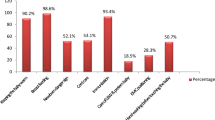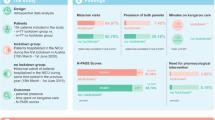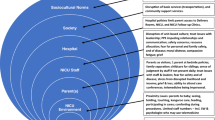Abstract
Poor care seeking contributes significantly to high neonatal mortality in developing countries. The study was conducted to identify care-seeking patterns for sick newborns in rural Rajasthan, India, and to understand family perceptions and circumstances that explain these patterns. Of the 290 mothers interviewed when the infant was 1 to 2 months of age, 202 (70%) reported at least one medical condition during the neonatal period that would have required medical care, and 106 (37%) reported a danger sign during the illness. However, only 63 (31%) newborns with any reported illness were taken to consult a care provider outside home, about half of these to an unqualified modern or traditional care provider. In response to hypothetical situations of neonatal illness, families preferred home treatment as the first course of action for almost all conditions, followed by modern treatment if the child did not get better. For babies born small and before time, however, the majority of families does not seem to have any preference for seeking modern treatment even as a secondary course of action. Perceptions of ‘smallness’, not appreciating the conditions as severe, ascribing the conditions to the goddess or to evil eye, and fatalism regarding surviving newborn period were the major reasons for the families’ decision to seek care. Mothers were often not involved in taking this critical decision, especially first-time mothers. Decision to seek care outside home almost always involved the fathers or another male member. Primary care providers (qualified or unqualified) do not feel competent to deal with the newborns. The study findings provide important information on which to base newborn survival interventions in the study area: need to target the communication initiatives on mothers, fathers and grandmothers, need for tailor-made messages based on specific perceptions and barriers, and for building capacity of the primary care providers in managing sick newborns.
This is a preview of subscription content, access via your institution
Access options
Subscribe to this journal
Receive 12 print issues and online access
$259.00 per year
only $21.58 per issue
Buy this article
- Purchase on Springer Link
- Instant access to full article PDF
Prices may be subject to local taxes which are calculated during checkout
Similar content being viewed by others
References
Lawn JE, Cousens S, Zupan J, Lancet Neonatal Survival Steering Team. 4 million neonatal deaths: when? where? why? Lancet 2005; 365 (9462): 891–900.
Dadhich JP, Paul V (eds). State of India's Newborns. National Neonatology Forum and Save the Children: New Delhi/Washington DC, US, 2004.
Bang AT, Bang RA, Baitule S, Deshmukh M, Reddy MH . Burden of morbidities and the unmet need for health care in rural neonates—a prospective observational study in Gadchiroli, India. Indian Pediatr 2001; 38 (9): 952–965.
Bhandari N, Bahl R, Taneja S, Martines J, Bhan MK . Pathways to infant mortality in urban slums of Delhi, India: implications for improving the quality of community- and hospital-based programmes. J Health Popul Nutr 2002; 20 (2): 148–155.
Sutrisna B, Reingold A, Kresno S, Harrison G, Utomo B . Care-seeking for fatal illnesses in young children in Indramayu, west Java, Indonesia. Lancet 1993; 342 (8874): 787–789.
National Family Health Survey Fact sheets 2005–6: India and Rajasthan. http://www.nfhsindia.org/pdf/IN.pdf; http://www.nfhsindia.org/pdf/RJ.pdf.
de Zoysa I, Bhandari N, Akhtari N, Bhan MK . Careseeking for illness in young infants in an urban slum in India. Soc Sci Med 1998; 47 (12): 2101–2111.
Winch PJ, Ashraful Alam MA, Akther A, Afroz D, Ashraf Ali N, Ellis AA et al., the Bangladesh PROJAHNMO Study Group. Local understandings of vulnerability and protection during the neonatal period in Sylhet district, Bangladesh: a qualitative study. Lancet 2005; 366 (9484): 478–485.
Jalil F . Perinatal health in Pakistan: a review of the current situation. Acta Paediatrica 2004; 93 (10): 1273–1279.
Acknowledgements
We thank Dr Rajiv Bahl, Medical Officer, Department of Child and Adolescent Health, World Health Organization (WHO), for reviewing the paper and providing useful inputs in finalizing the paper.
Author information
Authors and Affiliations
Corresponding author
Additional information
Disclosure
The authors have declared no financial interests.
Rights and permissions
About this article
Cite this article
Mohan, P., Iyengar, S., Agarwal, K. et al. Care-seeking practices in rural Rajasthan: barriers and facilitating factors. J Perinatol 28 (Suppl 2), S31–S37 (2008). https://doi.org/10.1038/jp.2008.167
Published:
Issue Date:
DOI: https://doi.org/10.1038/jp.2008.167
This article is cited by
-
Perception and experiences of adolescent mothers and communities in caring for their preterm babies: findings from an in-depth study in rural Bangladesh
BMC Pregnancy and Childbirth (2024)
-
Knowledge about neonatal danger signs and associated factors among mothers of children aged 0–12 months in a rural county, Southwest of China: a cross-sectional study
BMC Pregnancy and Childbirth (2022)
-
Illness recognition and appropriate care seeking for newborn complications in rural Oromia and Amhara regional states of Ethiopia
BMC Pediatrics (2018)
-
Responses to hypothetical health scenarios overestimate healthcare utilization for common infectious syndromes: a cross-sectional survey, South Africa, 2012
BMC Infectious Diseases (2018)
-
Appropriateness and timeliness of care-seeking for complications of pregnancy and childbirth in rural Ethiopia: a case study of the Maternal and Newborn Health in Ethiopia Partnership
Journal of Health, Population and Nutrition (2017)



